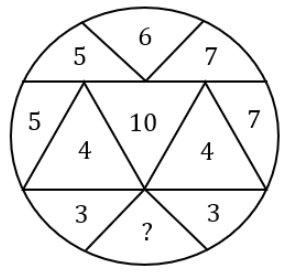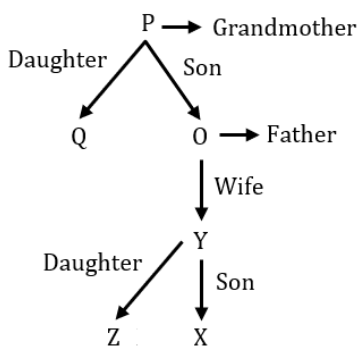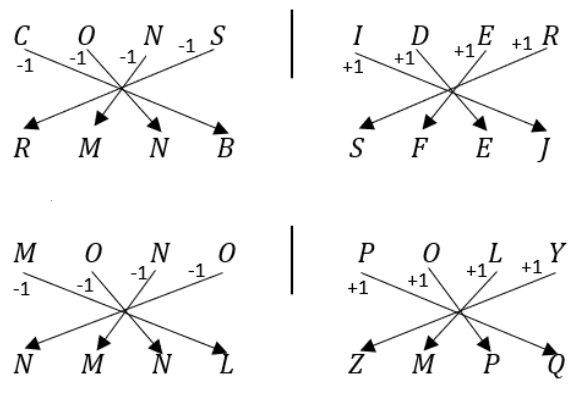NIC-NIELIT STA 2020
October 25, 2023NIC-NIELIT STA 2020
October 25, 2023NIC-NIELIT STA 2020
|
Question 14
|
Directions for question number 13 to 15:
Relationship between different elements is provided in the statements. The statements are followed by conclusions. Study the conclusions based on the given statement and choose the correct answer.
Q13: T >= U = V <= W < X; V >= Y
Q14. P <= Q <= R > S; T >= R; S >= U
Conclusions:
(I) T > S
(II) U < R
Relationship between different elements is provided in the statements. The statements are followed by conclusions. Study the conclusions based on the given statement and choose the correct answer.
Q13: T >= U = V <= W < X; V >= Y
Q14. P <= Q <= R > S; T >= R; S >= U
Conclusions:
(I) T > S
(II) U < R
|
if only conclusion (I) follows
|
|
|
if only conclusion (II) follows
|
|
|
if neither (I) nor (II) conclusion follows
|
|
|
if both (I) and (II) conclusions follow
|
Question 14 Explanation:
P <= Q <= R > S; T >= R; S >= U
T >= R > S R > S>=U
T>S U<r
T >= R > S R > S>=U
T>S U<r
</r
|
Question 15
|
Directions for question number 13 to 15:
Relationship between different elements is provided in the statements. The statements are followed by conclusions. Study the conclusions based on the given statement and choose the correct answer.
Q13: T >= U = V <= W < X; V >= Y
Q15: A <= B < C >= D; C <= E <= F
Conclusions:
(I) F >= D
(II) A > E
Relationship between different elements is provided in the statements. The statements are followed by conclusions. Study the conclusions based on the given statement and choose the correct answer.
Q13: T >= U = V <= W < X; V >= Y
Q15: A <= B < C >= D; C <= E <= F
Conclusions:
(I) F >= D
(II) A > E
|
if only conclusion (I) follows
|
|
|
if only conclusion (II) follows
|
|
|
if neither (I) nor (II) conclusion follows
|
|
|
if both (I) and (II) conclusions follow
|
Question 15 Explanation:
A <= B < C >= D; C <= E <= F
D <= C <= E < F
F >= D
D <= C <= E < F
F >= D
|
Question 16
|
Five people are standing in a row. Aman is standing next to Karan but not adjacent to Tanuj. Radhika is standing next to Priyanka who is standing on the extreme left and Tanuj is not standing next to Radhika. Who are Standing adjacent to Aman?
|
Radhika and Karan
|
|
|
Karan and Tanuj
|
|
|
Karan and Priyanka
|
|
|
Radhika and Tanuj
|
Question 16 Explanation:

|
Question 17
|
Complete the following series
4, 27, 256, 3125, _____
4, 27, 256, 3125, _____
|
46656
|
|
|
6250
|
|
|
800000
|
|
|
1024
|
Question 17 Explanation:
22 = 4
33 = 27
44 = 256
55 = 3125
66 = 46656
33 = 27
44 = 256
55 = 3125
66 = 46656
|
Question 18
|
A Businessman purchases an item at a certain price and marks its price up by 30%. He sells the item at a certain discount on markup price and makes a net profit of 4% on the whole transaction. Find the discount given by a businessman on markup price.
|
10
|
|
|
15
|
|
|
26
|
|
|
20
|
|
Question 19
|
Ramesh’s father is a paediatrician. Ram’s father is a trader. Krishan’s father is a school teacher. Krishan falls ill. Where should his father take him?
|
to home
|
|
|
to school
|
|
|
to Ramesh’s father
|
|
|
to Ram’s father
|
Question 19 Explanation:
Ramesh’s father is a paediatrician
Ram’s father is a trader
Krishan’s father is a school teacher
Krishan falls ill
According to the given input Ramesh’s father is a paediatrician. So, they went to Ramesh’s father.
Ram’s father is a trader
Krishan’s father is a school teacher
Krishan falls ill
According to the given input Ramesh’s father is a paediatrician. So, they went to Ramesh’s father.
|
Question 20
|
What is the total number of ways to reach A to B in the network given?


|
12
|
|
|
16
|
|
|
20
|
|
|
22
|
|
Question 21
|
Find the missing number.


|
14
|
|
|
10
|
|
|
9
|
|
|
3
|
|
Question 22
|
If 5% income of P is equal to 15% income of Q and 10% income of Q is equal to 20% income of R. If income of R is ₹ 2000, then what are the incomes of P and Q respectively?
|
₹ 4000 and ₹ 8000
|
|
|
₹ 12000 and ₹ 4000
|
|
|
₹ 15000 and ₹ 5000
|
|
|
₹ 18000 and ₹ 6000
|
Question 22 Explanation:
5%P = (15/100)*Q
(10/100)*Q = (20/100)*R
(20/100)*2000
=4000
(10/100)*Q = 4000
Q = 4000
(10/100)*Q = (20/100)*R
(20/100)*2000
=4000
(10/100)*Q = 4000
Q = 4000
(5/100)*P = (15/100)*4000
=600
P = (600*100)/5
P=12000
|
Question 23
|
Directions for question number 23 to 26:
Answer the questions on the basis of the data given below:
O is X’s father
Y is Z’s mother
P is O’s mother
X is Z’s sister
Q23. If P has a daughter Q, then how is Q related to Z?
Answer the questions on the basis of the data given below:
O is X’s father
Y is Z’s mother
P is O’s mother
X is Z’s sister
Q23. If P has a daughter Q, then how is Q related to Z?
|
Aunt
|
|
|
Mother
|
|
|
Sister
|
|
|
Daughter
|
Question 23 Explanation:
If P has a daughter Q, then Q related to Z is Aunt.
|
Question 24
|
Directions for question number 23 to 26:
Answer the questions on the basis of the data given below:
O is X’s father
Y is Z’s mother
P is O’s mother
X is Z’s sister
Q24. How is Y related to O?
Answer the questions on the basis of the data given below:
O is X’s father
Y is Z’s mother
P is O’s mother
X is Z’s sister
Q24. How is Y related to O?
|
Wife
|
|
|
Sister
|
|
|
Mother
|
|
|
Daughter
|
Question 24 Explanation:

Y related to O is wife.
|
Question 25
|
Directions for question number 23 to 26:
Answer the questions on the basis of the data given below:
O is X’s father
Y is Z’s mother
P is O’s mother
X is Z’s sister
Q25. How is O related to Z?
Answer the questions on the basis of the data given below:
O is X’s father
Y is Z’s mother
P is O’s mother
X is Z’s sister
Q25. How is O related to Z?
|
Brother
|
|
|
Cousin
|
|
|
Father
|
|
|
Uncle
|
Question 25 Explanation:

O related to Z is father.
|
Question 26
|
Directions for question number 23 to 26:
Answer the questions on the basis of the data given below:
O is X’s father
Y is Z’s mother
P is O’s mother
X is Z’s sister
Q26. How is P related to X?
Answer the questions on the basis of the data given below:
O is X’s father
Y is Z’s mother
P is O’s mother
X is Z’s sister
Q26. How is P related to X?
|
Mother
|
|
|
Grandmother
|
|
|
Sister
|
|
|
Daughter
|
Question 26 Explanation:

P related to X is Grandmother.
|
Question 27
|
14, 28, 20, 20, 40, 32, 64, _______
|
52
|
|
|
56
|
|
|
96
|
|
|
128
|
Question 27 Explanation:

|
Question 28
|
5 16 49 104 181 ______
|
271
|
|
|
298
|
|
|
280
|
|
|
281
|
Question 28 Explanation:

|
Question 29
|
In a certain code, ‘CONSIDER’ is written as RMNBSFEJ, how is ‘MONOPOLY’ written in that code?
|
LNMNZMPQ
|
|
|
NMNLZMPQ
|
|
|
POPNXKNO
|
|
|
NMNLXKNO
|
Question 29 Explanation:

|
Question 30
|
Directions for question number 30 to 31:
Two statements followed by four conclusions numbered from (I) to (IV) are given. You have to take the two statements to be true even if these seem to be at variance from the commonly known facts. Read all the conclusions and decide which of the given conclusions logically follow from the two given statements disregarding commonly known facts.
Q30. All Shoes are Socks
Some Socks are Gloves
Conclusions:
(I) Some Shoes are Gloves
(II) Some Socks are Shoes
(III) All Gloves are Shoes
(IV) No Shoes are Gloves
Two statements followed by four conclusions numbered from (I) to (IV) are given. You have to take the two statements to be true even if these seem to be at variance from the commonly known facts. Read all the conclusions and decide which of the given conclusions logically follow from the two given statements disregarding commonly known facts.
Q30. All Shoes are Socks
Some Socks are Gloves
Conclusions:
(I) Some Shoes are Gloves
(II) Some Socks are Shoes
(III) All Gloves are Shoes
(IV) No Shoes are Gloves
|
Only (I) follows
|
|
|
Only (II) follows
|
|
|
Only (III) follows
|
|
|
Only (IV) follows
|
Question 30 Explanation:

Correct Answer: D
Question 14 Explanation:
P <= Q <= R > S; T >= R; S >= U
T >= R > S R > S>=U
T>S U<r
T >= R > S R > S>=U
T>S U<r
</r
